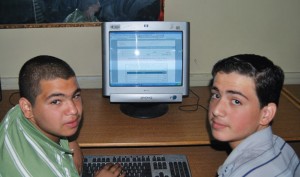[vc_row][largeur vc_column = »1/1″][vc_column_text]
JORDANIE:
Banking on Bona Fide Human Capital Through a Real-World Training Program
[/vc_column_text][/vc_colonne][/vc_row][vc_row][largeur vc_column = »2/3″][vc_column_text]
Students market their wares during the MIS-Online exhibition.
Jordan is banking on its most precious capital asset to catapult it into the global marketplace. Versatile and agile, this capital increases its value with time and experience and is none other than young Jordanians themselves, so long as they receive multidisciplinary academic and career training.
The Education Reform Support Program, or ERSP, funded by USAID and implemented by Creative, is currently reaching more than 3,000 étudiants en 120 Jordanian schools with an exciting e-learning program that builds entrepreneurial skills among 11th graders. The e-learning program, called MIS-Online, adapts a vocational training approach to an academic environment to produce graduates with versatile information technology skills, business acumen and the capacity to think critically and creatively—not to mention giving young people economic viability and ultimately having a stake in society; ainsi, leading to good citizenship.
Jordan’s sense of urgency about transforming its education system and the quality of its graduates is spurred by the country’s 15 percent unemployment rate which doubles to nearly 32 percent among young people. Dans 2009, presque 70 percent of the population was under 30 years of age and adolescents accounted for 22 pour cent de la population totale. Selon un 2005 study by the European Training Foundation, the main causes of youth unemployment in Jordan are the lack of career guidance counseling and lack of opportunities to find satisfying work following graduation. In a nutshell, both high school and higher education graduates have difficulty obtaining jobs that match their education, and employers complain that the skills graduates traditionally bring do not meet their business needs.
Lacking the oil resources of many of its neighbors, Jordan quickly realized that its most valuable asset for engaging economically with the world is its human capital. His Majesty the King of Jordan—pointing to the source of creativity and entrepreneurial success that creates jobs—is reputed to have noted, « Jordan only has its brains to export. » The ERSP project is helping implement the Jordanian Ministry of Education’s national strategic plan for modernizing its education system known as the Education Reform for Knowledge Economy (ERfKE). ERSP is aligning schooling to the needs of the labor market by moving beyond traditional rote memorization and instead instilling analytical thinking and familiarity with and the capacity to work with technology.
 |
Building a dream, young entrepreneurs at work with the MIS-Online application. |
« Business education is stove-piped in Jordan and so we realized we needed to revamp the system and created MIS-Online with a committee of academic and private sector experts. It was a challenge to develop and integrate it into the curriculum and into the school day, » said Nilhan Siam, the Education Program Manager responsible for the MIS-Online Program. Blending hands-on experience with academic learning, the MIS-Online program is divided over the course of two scholastic semesters. During the first semester, students develop an idea, and conduct a feasibility study and implementation plan for a business. Au deuxième semestre, the students manage their business, learning how to present themselves professionally and understand critical concepts including production, quality assurance, personnel management, and problem solving. The program buttresses students with robust information resources and exposes them to career paths they might otherwise not know about or even consider.
« MIS-Online helped us link between school subjects and real life, giving no limits to thinking and the ability to harness our energy, » said twenty-one year old Ala’a Omran Ahmad Farouqa who participated in the MIS-Online program in 2007 when she was still in grade 11. « MIS-Online was the first step. Il’s like walking on the red carpet. MIS-Online showed me capabilities that I didn’t know I had, including thinking outside the box. Students in the program were more prepared for the outside world, and more prepared than the ordinary students who didn’t participate in the program, » added Farouqa, now a third year student at the University of Jordan studying Public Administration.
Farouqa created an E-marketing guide as a result of her participation in the MIS-Online program which she continued to run for a couple of years thereafter. Given that Jordanian women are more likely to be unemployed, the program has given her a boost on many levels. Asked why she created the E-guide, her reply illustrates how this young woman’s perspective has changed: « I find marketing is fun, as it reflects my personality, there are always new things to do, marketing is the gateway for creativity – in my opinion – and because we all take a lot of time looking for what we want. Because time is money, and money talks, my E-guide helps to save a lot of time, as it helps consumers know where to go, how a product looks, the specifics, and everything that they need to know about it. »
According to Siam, teachers initially encountered a mixed reaction among students—some were enthusiastic while others expressed concern about the additional work. MIS-Online is thus far considered an enrichment program and requires four hours per week of classwork, besides the student-centered out-of-school team work. « But after they [étudiants] take the course, they can taste the fruit of their efforts. They improve and discover the skills that they are good at and need to survive and thrive economically, » said Siam.[/vc_column_text][/vc_colonne][largeur vc_column = »1/12″][/vc_colonne][largeur vc_column = »1/4″][vc_widget_sidebar sidebar_id= »barre latérale-primaire »][/vc_colonne][/vc_row]